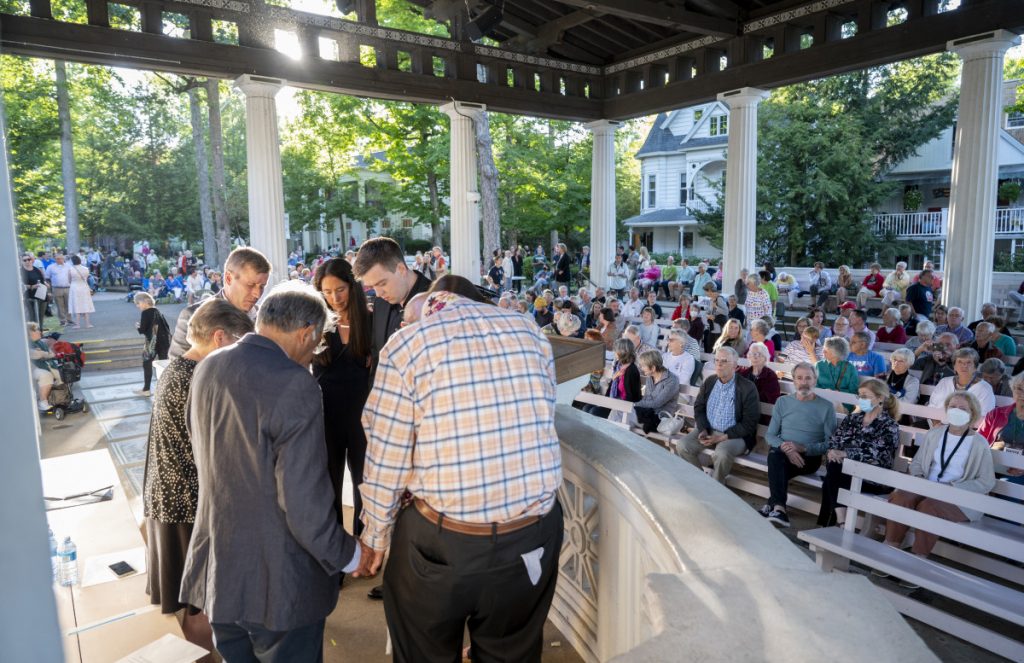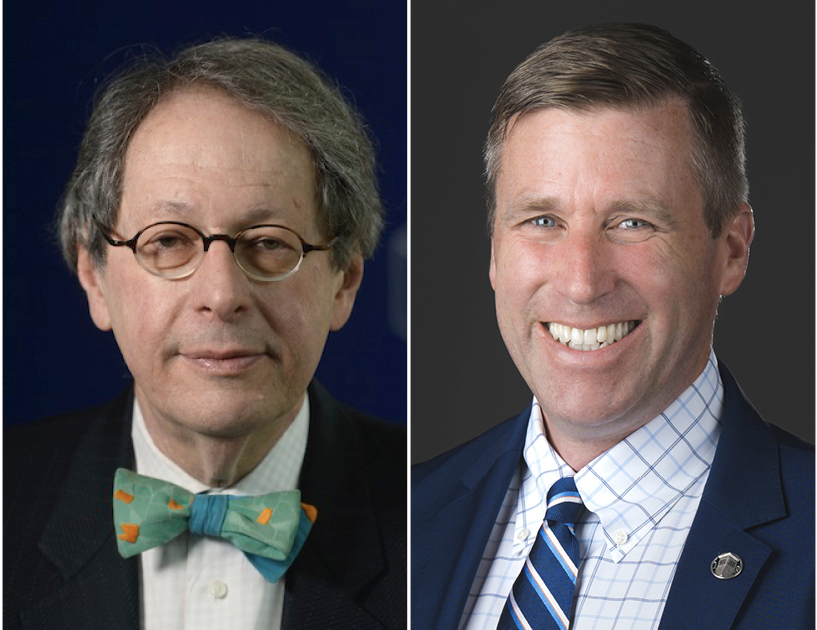
Alyssa Bump, Kaitlyn Finchler & Arden Ryan
Staff writers
Saturday Aug. 12, 2023, will be a day of remembrance and healing — and one honoring the resilience of free expression — marking the anniversary of the attack on prolific author Salman Rushdie on the Institution’s Amphitheater stage.

One year ago, Henry Reese, co-founder of City of Asylum Pittsburgh, was invited alongside Rushdie, a Booker Prize award-winning author, to host a 10:45 a.m. lecture closing 2022’s Week Seven theme “More than Shelter: Redefining the American Home.” The pair planned to explore the protection of persecuted writers and “the importance of the literary arts in an age dominated by the false narratives of the powerful,” Rushdie told the Daily in 2022.
Rushdie himself is a persecuted writer — in 1989, Iran Ayatollah Khomeini issued a fatwa against him, claiming his book The Satanic Verses was “blasphemous,” misrepresenting the Quran and the Muslim faith.
Reese was prepared to moderate the morning lecture with Rushdie when a New Jersey man allegedly stormed the Amp stage and stabbed Rushdie several times during the opening remarks.
Confusion and chaos erupted in the moments after the attack. With a community in shock and national media attention swarming the Institution, the attack on free speech witnessed by thousands of audience members was “unlike anything in our 150-year history,” Chautauqua Institution President Michael E. Hill said hours later that day, at a vigil ceremony quickly organized at the Hall of Philosophy.
This week, Hill said the one-year anniversary of the attack means different things to everyone — whether they were present at Chautauqua on Aug. 12, 2022, or not.
“There are some that are still healing,” Hill said. “Almost everyone had a different experience of that day.”
A series of events have been scheduled for Saturday in order to help navigate those experiences, and to continue the work Reese and Rushdie were set to discuss in 2022. The day begins with a Community Grief Processing session at 10 a.m. Saturday in the Literary Arts Center at Alumni Hall’s Garden Room, led by Amit Taneja, senior vice president and chief IDEA officer. Mental health counselors from the Chautauqua County Department of Mental Hygiene will be available for this session that’s private and confidential, yet open to whoever may want or need to attend.
Not only were there people who witnessed the attack, Hill said, who had a “very understandable and acute” response — there are also those who did not witness the event but felt it still “pierced a pretty solid sense of safety that exists here.”
This Saturday’s events, he said, encourage “another step in that healing,” in which some of the leadership team may not have been able to take part of last year due to administrative and security responsibilities.
“Our responses as community members really had to be pushed off and delayed because there was too much,” Hill said. “Whether that was intense media scrutiny, trying to provide counseling services for anyone (who) was directly impacted,” or those not in attendance who were affected.
To observe the anniversary of the attack on Rushdie, Hill will be in conversation with Reese at 2 p.m. Saturday in the Hall of Philosophy. He said he is looking forward to being in conversation with Reese and “bringing back” what was taken from the community.
“What Henry and his wife Diane have done in Pittsburgh, has had far reaching implications for writers and for voices that need to be heard,” Hill said.
Reese will be sharing his experiences with City of Asylum, how and why he got started with the program, and where he sees it going from here, Hill said.
“We’re completing the conversation that didn’t happen,” Hill said. “We’re giving that conversation back to Chautauqua and then teeing up the broader issues that we’re going to explore for the week.”
The day after the attack, the alleged assailant Hadi Matar was charged with second-degree attempted murder and second-degree assault without bail of Rushdie and Reese, respectively. Ned Barone, Chautauqua County public defender, entered a not-guilty plea on Matar’s behalf. After a year of court hearings, the trial is expected to take place in January or February of 2024.
Rushdie survived several near-fatal stab wounds sustained on Aug. 12, 2022; he was airlifted to a hospital in Erie, Pennsylvania, where he was in surgery for hours and placed on a ventilator. Recovering, he is now blind in his right eye and struggles to write at times due to nerve damage in his hand. A recent public appearance at the PEN America gala, where he was honored with the organization’s Centenary Courage Award, drew renewed attention to freedom of speech issues — issues that Rushdie and Reese have long worked toward.
Hill said Reese’s work with City of Asylum Pittsburgh is “worthy of being elevated,” and the events of Aug. 12, 2022, are important to commemorate and come back together as a community. They hope to do this through the week’s theme, “Freedom of Expression, Imagination and the Resilience of Democracy.”
“I’m there to help remember the events and to try to help the Chautauqua community to come to terms with it, to move on, (while) not forgetting,” Reese said.
Reese was first inspired to support persecuted writers when he and his wife attended a 1997 lecture by Rushdie in Pittsburgh.
“He was first beginning to go public after the fatwa, (since) he had been in hiding,” Reese said. “In the course of the talk, he mentioned the program City of Asylum that was then only in Europe.”
Reese and his wife, longtime and committed readers of Rushdie’s work, were “impressed at the need” to provide threatened writers a safe space to live and work. They began using their rental unit to house writers in need.
After a few years of City of Asylum’s expansion to the United States, its work was integrated into the larger organization, and City of Asylum Pittsburgh became official in 2003.
Reese said he was moved by Rushdie’s proclamation of “the power, the need and the meaning of fiction, in particular, to engage the imagination of communities and to bring together unlike communities into a spirit of hopefully understanding.”
At Chautauqua, Reese said, “it’s obvious that people are convening in the spirit of shared understanding, commitment to the value of arts and culture … engaging and living a life where value is represented by that commitment.”
Reese said it’s important to support oppressed authors and controversial books by reading the works and talking about their meanings.
Movements like City of Asylum, which support “freedom of expression, and defend it in the simplest way,” are foundational to supporting oppressed authors, Reese said.
A panel of such oppressed authors, provided refuge by City of Asylum, were to share their experiences with Chautauqua later in the day on Aug. 12, 2022; like most other events that day, it was canceled. There was only one program held on Aug. 12 after the attack: a vigil in the Hall of Philosophy with Chautauqua’s interfaith leaders, facilitated in large part by the Rev. Natalie Hanson, the Institution’s interim senior pastor at the time.
In the hours and days that followed Aug. 12, Hanson led several community-wide prayers and countless conversation. She’ll lead such a gathering again, one for remembrance and healing at 4 p.m. Saturday at the Hurlbut Memorial Community United Methodist Church.
Despite the circumstances, Hill said he’s looking forward to commemorating the event with colleagues such as Hanson.
“(She) will always be a hero in this narrative,” Hill said. “Her work as our interim senior pastor was among the most brilliant expressions of what it means to be a minister.”
Whether in big ways or small, Aug. 12 “has been on our hearts and in our minds the whole year, accentuated maybe by the amount of violent incidents there have been throughout the last 12 months,” Hanson said. “And that doesn’t always diminish an experience of violence — sometimes it’s an echo chamber.”
Every institution has emergency plans for tragedies, Hanson said, but there isn’t an emergency plan for community-wide trauma.
“The community really needed to gather,” Hanson said. “(So we) very quickly put the vigil together for that evening so that people could see each other’s faces — for the reassurance that we still cared for each other, that the relationship still held.”
Saturday’s service of healing is a “chance to gather the community so that the community can remember — not in a maudlin or tragic way — but to think about the way that memories are healed,” Hanson said.
The service will include a ritual of stones. When Chautauquans enter the service, they will pick out a small stone to carry with them throughout the ceremony.
“(The stone) symbolizes what they’re feeling or the burden they’ve been carrying or the experience they’ve had since then,” Hanson said.
Once the service concludes, participants have the choice of keeping their stone or letting it go. If an attendee chooses to keep their stone, they can have it blessed in the church.
“(The stones are) a way to physically symbolize the way we work through stuff,” Hanson said. “We carry it for a while, and there comes a time to learn from it and give it away.”
For Chautauquans who are not on the grounds that still want to observe the service, the event will be live streamed on Hurlbut’s Facebook page, YouTube and website.
The service will be followed by a reception at the church, which Hanson believes is “equally as important as the service itself,” allowing Chautauquans to talk and heal with each other in the present moment, in their own way.
Hanson said it is important to honor the one-year anniversary of the attack “to remember it, not to relive it” and “to mark what we’ve learned from it.”
“(The attack) did not break the community at Chautauqua,” Hanson said. “In fact, (the way) people responded to each other and to the situation affirms the power of what a community can be. We need to hold that dear and rejoice in that.”




